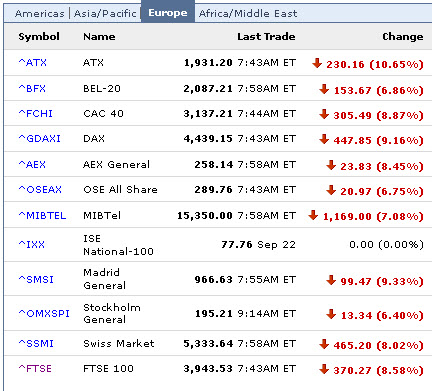One of the dominant myths of America is that we practice one of the
freest forms of capitalism on the face of the planet. Hard work and
prudence are rewarded, while Schumpeter’s ‘creative destruction’ quickly cleans out the mistakes.
Unlike most myths, this one apparently lacks a kernel of truth at the core.
As the details emerge over the various bailouts and market distortions,
it is becoming clearer that moral hazard has been increased, not
lessened, and that those who behaved prudently during the credit bubble
insanity are going to be punished.
Some are getting angry:
[quote]Community banking executives around the country responded
with anger yesterday to the Bush administration’s strategy of investing
$250 billion in financial firms, saying they don’t need the money,
resent the intrusion and feel it’s unfair to rescue companies from
their own mistakes.
And in offices around the country, bankers simmered.
Peter Fitzgerald, chairman of Chain Bridge Bank in McLean, said he was "much
chagrined that we will be punished for behaving prudently by now having
to face reckless competitors who all of a sudden are subsidized by the
federal government."
At Evergreen Federal Bank in Grants Pass, Ore., chief executive Brady
Adams said he has more than 2,000 loans outstanding and only three
borrowers behind on payments. "We
don’t need a bailout, and if other banks had run their banks like we
ran our bank, they wouldn’t have needed a bailout, either," Adams said. [/quote]
Punishing the Prudent
by Chris Martenson
One of the dominant myths of America is that we practice one of the
freest forms of capitalism on the face of the planet. Hard work and
prudence are rewarded, while Schumpeter’s ‘creative destruction’ quickly cleans out the mistakes.
Unlike most myths, this one apparently lacks a kernel of truth at the core.
As the details emerge over the various bailouts and market distortions,
it is becoming clearer that moral hazard has been increased, not
lessened, and that those who behaved prudently during the credit bubble
insanity are going to be punished.
Some are getting angry:
[quote]Community banking executives around the country responded
with anger yesterday to the Bush administration’s strategy of investing
$250 billion in financial firms, saying they don’t need the money,
resent the intrusion and feel it’s unfair to rescue companies from
their own mistakes.
And in offices around the country, bankers simmered.
Peter Fitzgerald, chairman of Chain Bridge Bank in McLean, said he was "much
chagrined that we will be punished for behaving prudently by now having
to face reckless competitors who all of a sudden are subsidized by the
federal government."
At Evergreen Federal Bank in Grants Pass, Ore., chief executive Brady
Adams said he has more than 2,000 loans outstanding and only three
borrowers behind on payments. "We
don’t need a bailout, and if other banks had run their banks like we
ran our bank, they wouldn’t have needed a bailout, either," Adams said. [/quote]


















